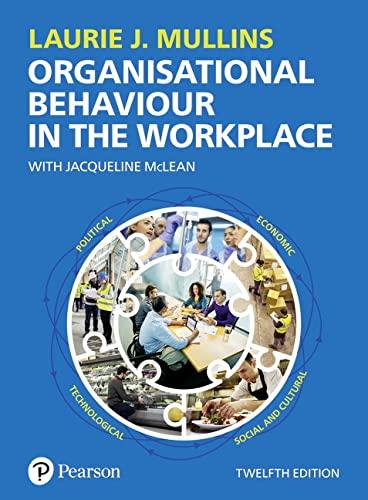In this zone, we critically discuss the concept of worklife balance and evaluate whether it is still
Question:
In this zone, we critically discuss the concept of work–life balance and evaluate whether it is still an important feature of organisational life in the twenty-first century workplace.
The concept of work–life balance (WLB) has been described as one of the top three challenges facing organisations and the HR profession.47 Theory and practice suggests that a major challenge has been the implementation, take up and monitoring of programmes that were intended to give the workforce a greater level of harmony between their work and personal lives and provide more flexibility in how, where and then they complete work tasks.48 A further challenge has been working with multiple, subjective perceptions of the concept and the value that end users may or may not attach to organisational initiatives that are in place.49 In general, work–life balance has also become a rather contested phrase. Gregory and Milner50 assert that the word ‘balance’ is inappropriate in this context, as it infers that work is not an integral part of life and it is somehow possible to trade one against the other. Beatson48 and Lutz51 concur and argue that a more contemporary parlance should be ‘work–life blend’ as there are times in life when, despite the best intentions, people struggle to find a clear dichotomy between the two. The dissonance caused by this metaphorical tug of war can lead to interrole conflict, tension and psychological distress.52 In consideration of this, Lutz concludes that the notion of balance is an idealistic, unachievable standard, the naive pursuit of which can result in a continuous sense of failure.
Arguably, the answer to this question is ‘yes.’ However, the importance that is ascribed to WLB may, as we established above, be a matter of subjective opinion between employers who offer the benefits and individuals who may or may not use them. Regardless of the complexities and challenges surrounding the concept, work is busier now than ever. The globalised, boundaryless, 24/7, hyperconnected, always on society has promulgated a culture where the business world never sleeps and individuals have constant access to work.53 MacCormick et al.54 describe this phenomenon as ‘job creep.’ To stem this tide, legislative changes, along with a raft of WLB campaigns, have reinforced the efforts of employers and HR managers to provide working arrangements that are more flexible, diverse and mutually beneficial to all parties concerned. Yet, despite employers’ positive attitudes towards, and commitment to, WLB and the mutual benefits that can be derived from its implementation, including increased production, a reduction in absenteeism and enhanced job satisfaction,55 evidence suggests that some individuals are not utilising the statutory or organisationalbased initiatives that their employers provide. This is highlighted in the CIPD UK Working Lives Survey.56 The study found that only 9% of employees sampled (n = 5215) use flexitime arrangements that are in place (33% don’t use) and only 6%
work from home (34% don’t). These findings infer that something is clearly preventing these individuals from making use of WLB initiatives. But what is it?
According to McCarthy et al.57 and Daverth et al.,58 one reason could be the relationship between line managers and their staff. Their research suggests that managers who have a proximal or close relationship with their staff, and are supportive of their work context, make a major difference between engagement and nonengagement in WLB initiatives. Beatson59 argues that managers can also be a barrier, either due to staff perceptions that they are unsupportive or because the organisation, through its culture and practices, has not effectively communicated the availability of, and support for, opportunities to achieve more flexibility in their work.
While the benefits of WLB to both individuals and the organisation are well documented in the literature and research data and cannot be discounted, the CIPD60 has raised concerns that WLB initiatives are excessively focused on meeting the needs of carers and parents. Beauregard49 concurs and caveats that organisations should be mindful of the potential ‘backlash’ from childfree staff, who believe that such initiatives are unfair and skewed towards parents, resulting in increased workloads if they do not use them. This clearly has implications for organisational behaviour in the workplace. Beauregard advises that those affected might overtly display their dissatisfaction by arriving at work late without permission to do so, create their own flexibility to redress the perceived inequity or take longer breaks than are normal or acceptable.
To conclude, WLB is still an important feature of organisational life in the twenty first century workplace.
However, people’s wants, needs and expectations of work and life differ. What might be overwork to one person may be equilibrium to another. Whether it is a matter of subjective perception or people’s reality, the search for balance or harmony and the decision to engage in WLB initiatives, should, arguably, be a personal choice and what feels right for them and their context. As Sara Just, Executive Producer of PBS News Hour in the US, stated ‘the truth is my work–life balance tilts pretty hard toward work. I know we are supposed to fight that, but ...if you love what you do, why apologise for the imbalance?’
1.What other reasons can you identify that may be discouraging individuals from engaging with WLB initiatives, particularly as they are geared towards providing a more flexible approach to work?
2.Evidence suggests that WLB initiatives are not working in the way in which they were intended. What alternative benefits could an organisation introduce to encourage more widespread engagement with, and participation in, flexible work practices?
3.What other challenges does WLB present to managers and HR practitioners in managing organisational behaviour in the twenty first century workplace?
Step by Step Answer:

Organisational Behaviour In The Workplace
ISBN: 9781292245485
12th Edition
Authors: Jacqueline Mclean, Laurie Mullins





